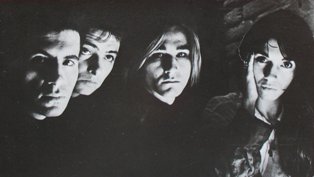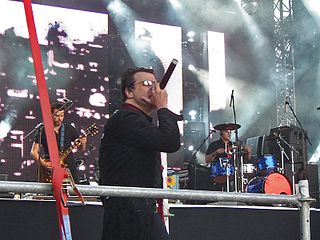
Ekatarina Velika, sometimes referred to as EKV for short, was a Serbian and Yugoslav rock band from Belgrade, being one of the most successful and influential Yugoslav music acts.

Van Gogh is a Serbian and former Yugoslav rock band from Belgrade.

Uspavanka za Radmilu M. is the sixth studio album by the Yugoslav rock band Bijelo Dugme, released in 1983.

Samo par godina za nas is the fifth studio album by the Serbian rock band Ekatarina Velika, released in 1989. It is the last one recorded with Bojan Pečar as a bassist. The album was produced by Mitar "Suba" Subotić, Theodore Yanni and Ekatarina Velika, with Suba and Yanni also included as guest stars. Another guest star was Tanja Jovićević on backing vocals and Zvonimir Đukić on guitar.

Laboratorija Zvuka, credited as Laboratorija (Laboratory) only on some of their releases, was a Serbian and Yugoslav rock band formed in Novi Sad in 1977. Laboratorija Zvuka were a prominent act of the Yugoslav rock scene, noted for their eccentric style, erotic lyrics, unusual line ups and bizarre circus-inspired stage performances.

Električni Orgazam is a Serbian rock band from Belgrade. Originally starting as a combination of new wave, punk rock and post-punk, the band later slowly changed their style, becoming a mainstream rock act. They were one of the most notable acts of the former Yugoslav rock scene.

Garavi Sokak is a Serbian folk rock/pop band from Novi Sad.

Piloti is a rock band from Belgrade. Formed in 1981, and initially immersed in the Yugoslav new wave scene, the band later moved towards mainstream pop rock, they came to prominence in the 1980s and early 1990s as one of the leading pop rock acts in former Yugoslavia. The band disbanded in 1997, only to be reformed in 2009 under the name Kiki Lesendrić & Piloti.

La Strada was a Serbian and former Yugoslav new wave and later alternative rock band from Novi Sad.
Ensemble Renaissance is the first early music ensemble in Serbia and the second in south-eastern Europe, having been founded in 1968. Ensemble Renaissance usually focuses on the music of the Middle Ages, Renaissance and Baroque. Occasionally, however, Ensemble performs modern music on ancient instruments.

Crni Biseri were a Yugoslav rock band formed in Belgrade in 1963. The band were one of the pioneers of the Yugoslav rock scene.

Oktobar 1864 was a Yugoslav rock band formed in Belgrade in 1984.

Oktobar 1864 is the first studio album by Yugoslav rock band Oktobar 1864, released in 1987.

Igra bojama is the second studio album by Yugoslav rock band Oktobar 1864, released in 1988.

Braća Left was a Serbian alternative rock band formed in Belgrade in 1992. Founded by former Oktobar 1864 and Armagedon members, Braća Left was a prominent act of the 1990s Serbian rock scene.

Elipse were a Yugoslav rock band formed in Belgrade in 1962. The band were one of the pioneers of the Yugoslav rock scene.

Slomljena Stakla was a Yugoslav pop rock band formed in Belgrade in 1982. They were a prominent act of the 1980s Yugoslav rock scene.

Ruž was a Serbian and Yugoslav pop rock band from Belgrade.
Heroina was a Yugoslav rock band formed in Novi Sad in 1982. They were a prominent act of the Yugoslav rock scene in the mid-1980s.
Tanja Jovićević is a Serbian and Yugoslav singer, best known as the former frontress of the rock band Oktobar 1864.
















